
sonic3air
Source and data to build Sonic 3 A.I.R. (Angel Island Revisited) and the Oxygen Engine
Stars: 429
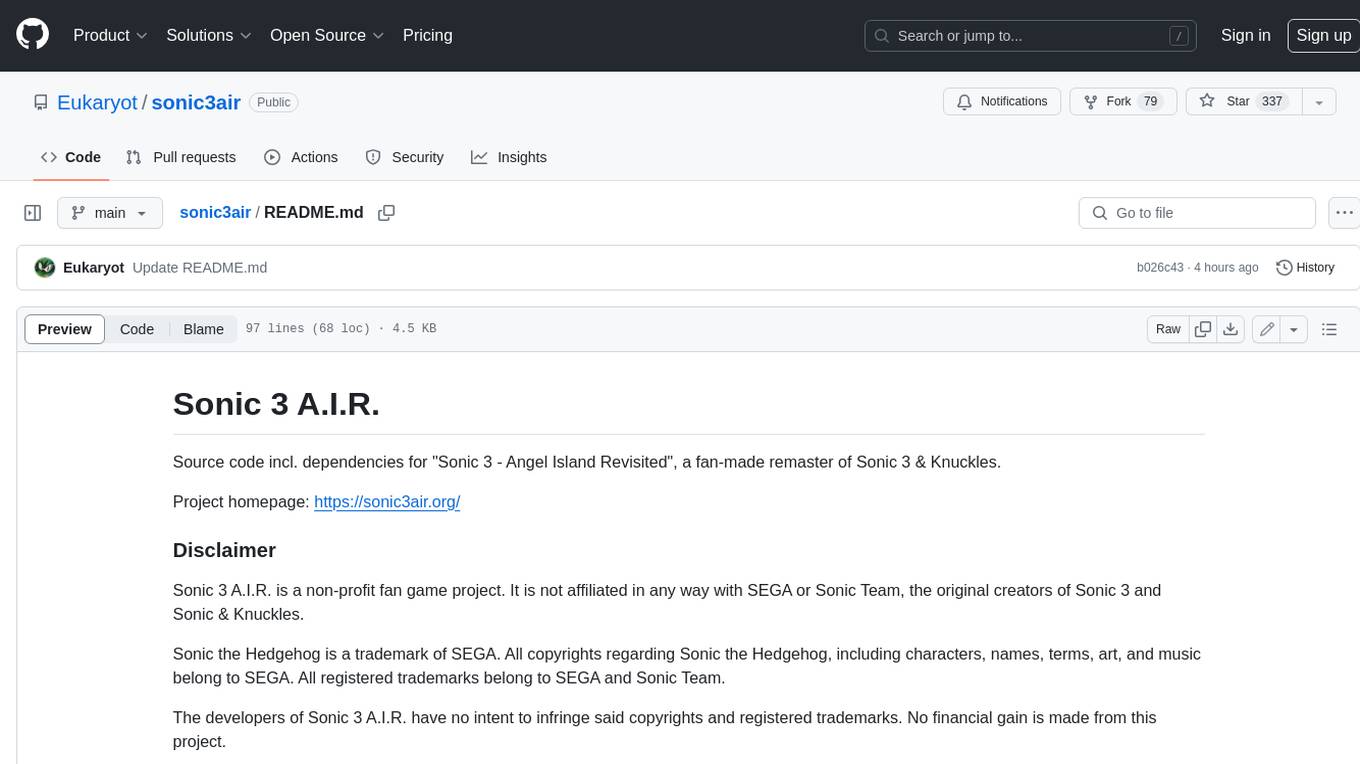
Sonic 3 A.I.R. is a non-profit fan game project that provides source code including dependencies for "Sonic 3 - Angel Island Revisited," a fan-made remaster of Sonic 3 & Knuckles. The project is split into several different projects, including external dependencies, librmx libraries, Lemonscript language library, Oxygen Engine, and S3AIR-specific C++ code. To build for different platforms, refer to the readme files in the respective subdirectories of "Oxygen/sonic3air/build." External libraries and code used in this project include SDL2, libogg & libvorbis, zlib, libcurl, jsoncpp, GLEW, Sound chip emulation related code from Genesis Plus GX, Discord Game SDK, xBRZ upscaler shader code, and Hqx upscaler shader code & data files.
README:
Source code incl. dependencies for "Sonic 3 - Angel Island Revisited", a fan-made remaster of Sonic 3 & Knuckles.
Project homepage: https://sonic3air.org/
Sonic 3 A.I.R. is a non-profit fan game project. It is not affiliated in any way with SEGA or Sonic Team, the original creators of Sonic 3 and Sonic & Knuckles.
Sonic the Hedgehog is a trademark of SEGA. All copyrights regarding Sonic the Hedgehog, including characters, names, terms, art, and music belong to SEGA. All registered trademarks belong to SEGA and Sonic Team.
The developers of Sonic 3 A.I.R. have no intent to infringe said copyrights and registered trademarks. No financial gain is made from this project.
Any commercial use of this project without SEGA's explicit consent is strictly prohibited.
This repository is split into several different projects:
- The larger external dependencies (namely SDL2, Ogg/Vorbis, zlib) inside the "framework" directory. These are copies of the respective open source projects, with a few custom changes applied where needed - see the "how-to-build.txt" files in there for details.
- The librmx libraries that together with the external dependencies build a foundation for my own projects (S3AIR and my private stuff). This primarily consists of rmxbase, a collection of helper and utility classes, and rmxmedia, which is providing a basic game framework built on top of SDL2 & OpenGL.
- Lemonscript language library, with compiler and runtime environment for script execution.
- Oxygen Engine, the backbone game engine powering Sonic 3 A.I.R. This includes input, graphics, audio handling, and all the other game application stuff, as well as a simulation environment built around lemonscript that - as far as needed for the purposes of S3AIR - emulates aspects of Sega Genesis hardware. Note that Oxygen can be built as its own application (OxygenApp) that lacks the S3AIR C++ code.
- S3AIR-specific C++ code, scripts and data in the "Oxygen/sonic3air" directory. Yes, that's what it's named.
For information on how to build for different platforms, find the readme files in the respective subdirectories of "Oxygen/sonic3air/build":
- Windows: "_vstudio"
- Mac: "_xcode"
- Linux: "_cmake"
- Android: "_android"
- Web: "_emscripten"
- Switch: "_make" (unmaintained)
Additional platform ports:
External libraries and code used in this project:
- SDL2 - in "framework/external/sdl"
- libogg & libvorbis - in "framework/external/ogg-vorbis"
- zlib incl. minizip - in "framework/external/zlib"
- libcurl - in "framework/external/curl"
- Dear ImGui - in "framework/external/imgui"
- jsoncpp - in "librmx/source/rmxbase/jsoncpp"
- GLEW - in "librmx/source/rmxmedia/glew"
- Sound chip emulation related code from Genesis Plus GX - in "Oxygen/oxygenengine/source/oxygen/simulation/sound"
- Discord Game SDK - in "Oxygen/sonic3air/source/external/discord_game_sdk"
- xBRZ upscaler shader code - in "Oxygen/oxygenengine/data/shader" and once more in "Oxygen/sonic3air/data/shader"
- Hqx upscaler shader code & data files - in "Oxygen/oxygenengine/data/shader" and once more in "Oxygen/sonic3air/data/shader"
Thanks to all contributors!
Source code contributions by:
- Sappharad
- Heyjoeway
- Carjem Generations
- Ultracoolguy
- gl33ntwine
- Rinnegatamante
- MDashK
Remastered soundtrack by:
- G Spindash
Game scripts & other contributions by:
- Vinegar
- Thorn
- Legobouwer
- GFX32
- Dynamic Lemons
- HazelSpooder
- iCloudius
- D.A. Garden
- Alieneer
- 3Pills
- Elsie The Pict
- TheMushrunt
- mrgrassman14
Additional thanks:
- All contributors of the Sonic 3 / Sonic & Knuckles Disassembly (https://github.com/sonicretro/skdisasm), which has proven itself a valuable source of information on S3&K code
Here's the bad news: This repository isn't meant for direct distribution. If you have your own changes that you want to share with the world, create a fork of this repo, instead of making pull requests. I'd very much appreciate that as I really want to avoid having too much overhead with managing / reviewing code changes made by others. I'd rather use the time to continue with implementing my own ideas into the project.
Plus there's a second reason, and that's an important one for me as well: It's about code ownership and software licenses. It's much easier to use the librmx, lemonscript and Oxygen Engine code elsewhere under a different license than GPL if I don't have to ask a larger group of contributors whether they are okay with it. Because there are some plans for possible future projects using these codes as a foundation, maybe even commercial ones where GPL could make things complicated.
-- Euka
For Tasks:
Click tags to check more tools for each tasksFor Jobs:
Alternative AI tools for sonic3air
Similar Open Source Tools

sonic3air
Sonic 3 A.I.R. is a non-profit fan game project that provides source code including dependencies for "Sonic 3 - Angel Island Revisited," a fan-made remaster of Sonic 3 & Knuckles. The project is split into several different projects, including external dependencies, librmx libraries, Lemonscript language library, Oxygen Engine, and S3AIR-specific C++ code. To build for different platforms, refer to the readme files in the respective subdirectories of "Oxygen/sonic3air/build." External libraries and code used in this project include SDL2, libogg & libvorbis, zlib, libcurl, jsoncpp, GLEW, Sound chip emulation related code from Genesis Plus GX, Discord Game SDK, xBRZ upscaler shader code, and Hqx upscaler shader code & data files.
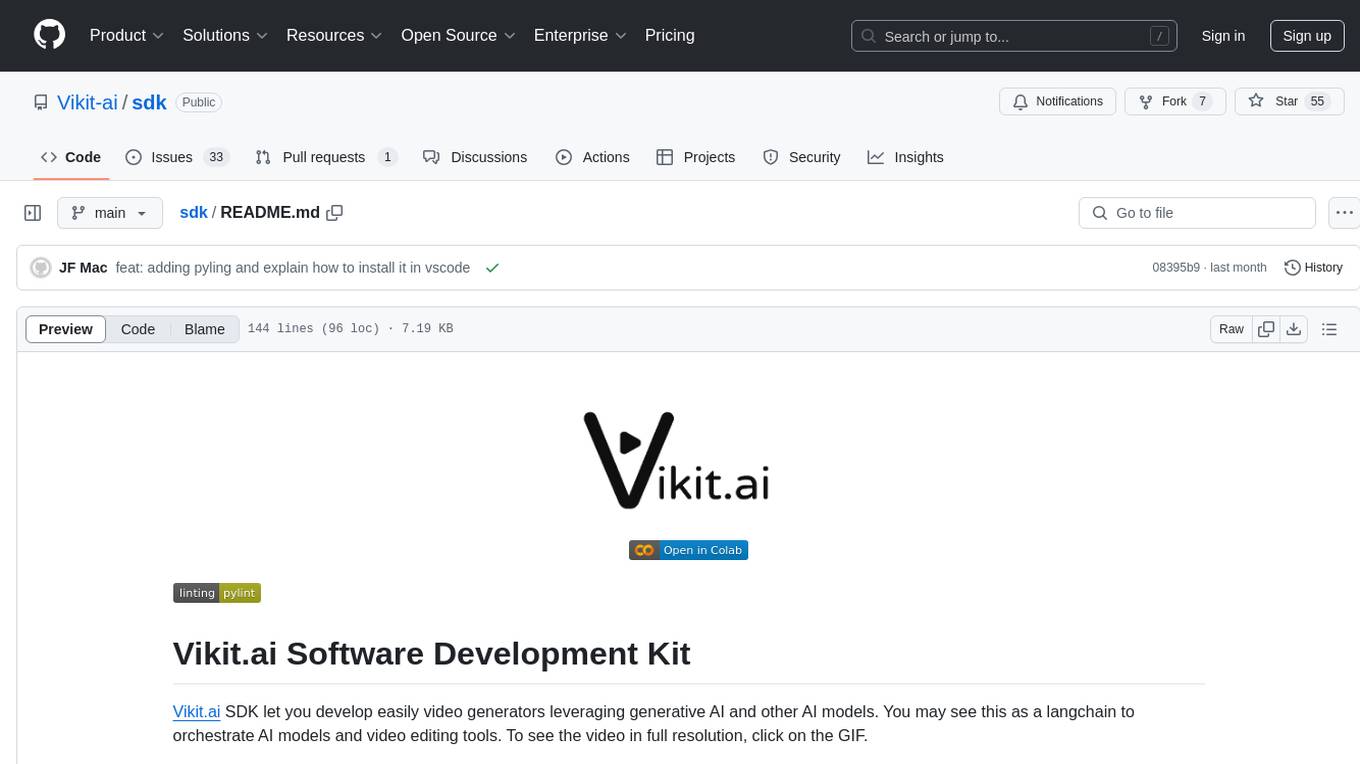
sdk
Vikit.ai SDK is a software development kit that enables easy development of video generators using generative AI and other AI models. It serves as a langchain to orchestrate AI models and video editing tools. The SDK allows users to create videos from text prompts with background music and voice-over narration. It also supports generating composite videos from multiple text prompts. The tool requires Python 3.8+, specific dependencies, and tools like FFMPEG and ImageMagick for certain functionalities. Users can contribute to the project by following the contribution guidelines and standards provided.

OpenDAN-Personal-AI-OS
OpenDAN is an open source Personal AI OS that consolidates various AI modules for personal use. It empowers users to create powerful AI agents like assistants, tutors, and companions. The OS allows agents to collaborate, integrate with services, and control smart devices. OpenDAN offers features like rapid installation, AI agent customization, connectivity via Telegram/Email, building a local knowledge base, distributed AI computing, and more. It aims to simplify life by putting AI in users' hands. The project is in early stages with ongoing development and future plans for user and kernel mode separation, home IoT device control, and an official OpenDAN SDK release.
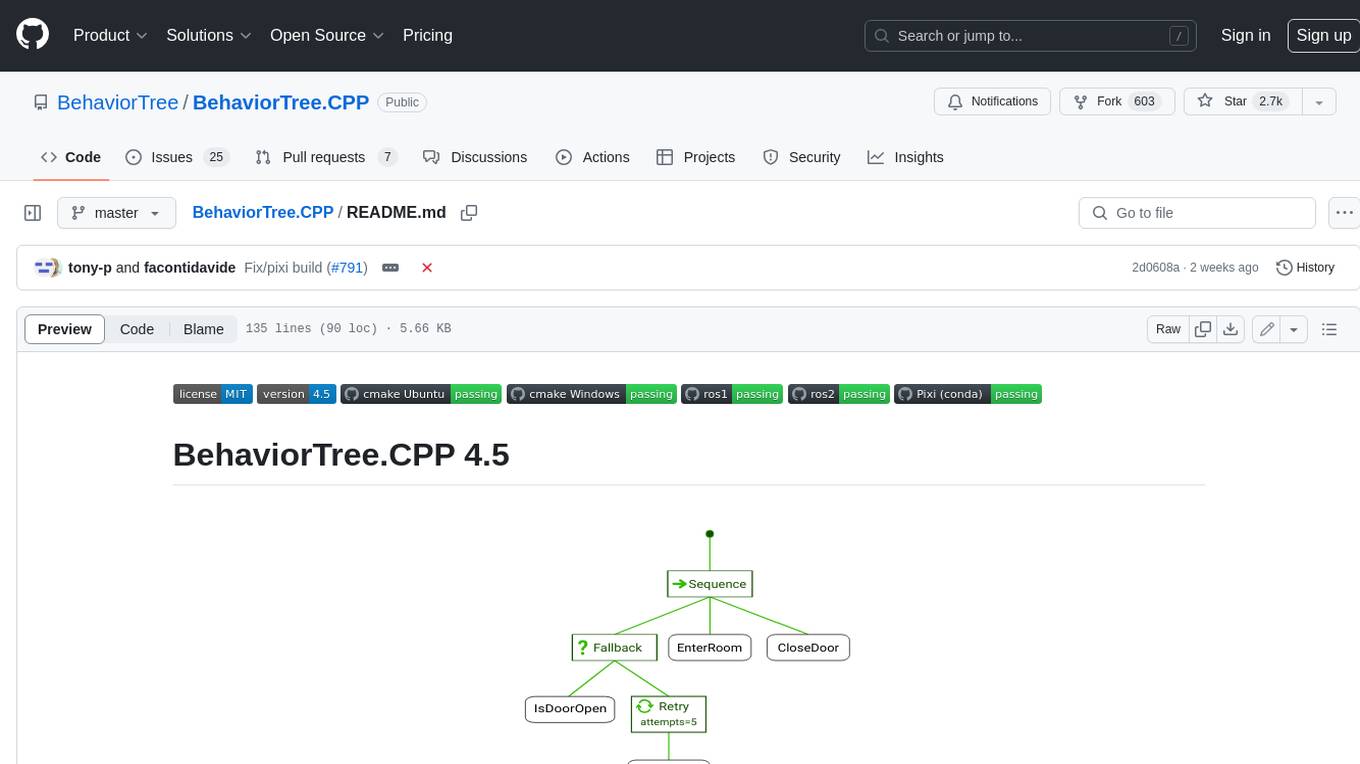
BehaviorTree.CPP
BehaviorTree.CPP is a C++ 17 library that provides a framework to create BehaviorTrees. It was designed to be flexible, easy to use, reactive and fast. Even if our main use-case is robotics, you can use this library to build AI for games, or to replace Finite State Machines. There are few features which make BehaviorTree.CPP unique, when compared to other implementations: It makes asynchronous Actions, i.e. non-blocking, a first-class citizen. You can build reactive behaviors that execute multiple Actions concurrently (orthogonality). Trees are defined using a Domain Specific scripting language (based on XML), and can be loaded at run-time; in other words, even if written in C++, the morphology of the Trees is not hard-coded. You can statically link your custom TreeNodes or convert them into plugins and load them at run-time. It provides a type-safe and flexible mechanism to do Dataflow between Nodes of the Tree. It includes a logging/profiling infrastructure that allows the user to visualize, record, replay and analyze state transitions.

CodeProject.AI-Server
CodeProject.AI Server is a standalone, self-hosted, fast, free, and open-source Artificial Intelligence microserver designed for any platform and language. It can be installed locally without the need for off-device or out-of-network data transfer, providing an easy-to-use solution for developers interested in AI programming. The server includes a HTTP REST API server, backend analysis services, and the source code, enabling users to perform various AI tasks locally without relying on external services or cloud computing. Current capabilities include object detection, face detection, scene recognition, sentiment analysis, and more, with ongoing feature expansions planned. The project aims to promote AI development, simplify AI implementation, focus on core use-cases, and leverage the expertise of the developer community.
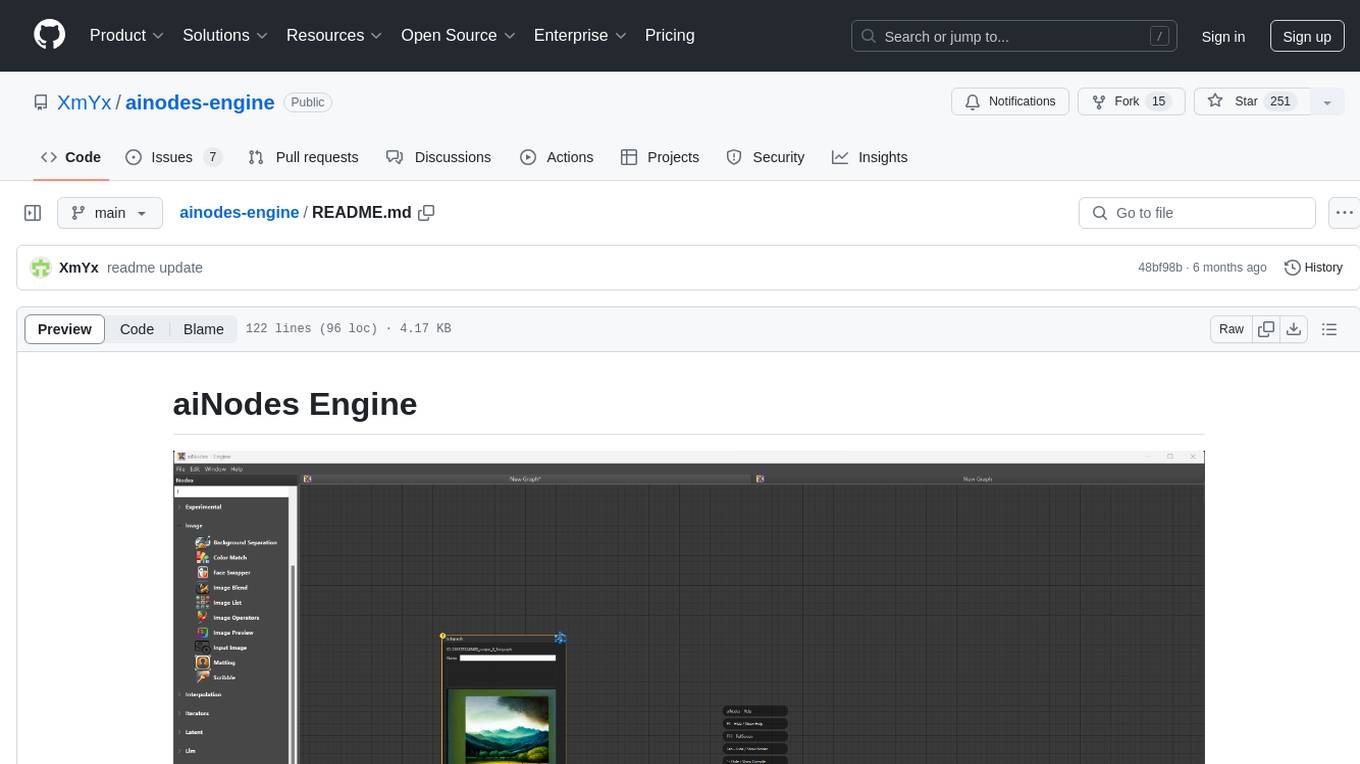
ainodes-engine
aiNodes Engine is a Python-based AI image/motion picture generator node engine with a live execution chain, python code editor node, and plug-in support. It offers full modularity, colored background drop, and easy node creation with IDE annotations. The project is officially supported by Deforum and incorporates various open-source projects like ComfyUI. It is designed to be flexible, with an Unreal-like execution chain, supporting features such as Deforum, Stable Diffusion, Upscalers, Kandinsky, ControlNet, and more. The engine allows for background separation, human matting/masking, compositing, drag and drop, subgraphs, and graph saving/loading from image metadata. It aims to provide a unique, controllable manner of working with a strict user-declared execution chain.

Sentient
Sentient is a personal, private, and interactive AI companion developed by Existence. The project aims to build a completely private AI companion that is deeply personalized and context-aware of the user. It utilizes automation and privacy to create a true companion for humans. The tool is designed to remember information about the user and use it to respond to queries and perform various actions. Sentient features a local and private environment, MBTI personality test, integrations with LinkedIn, Reddit, and more, self-managed graph memory, web search capabilities, multi-chat functionality, and auto-updates for the app. The project is built using technologies like ElectronJS, Next.js, TailwindCSS, FastAPI, Neo4j, and various APIs.
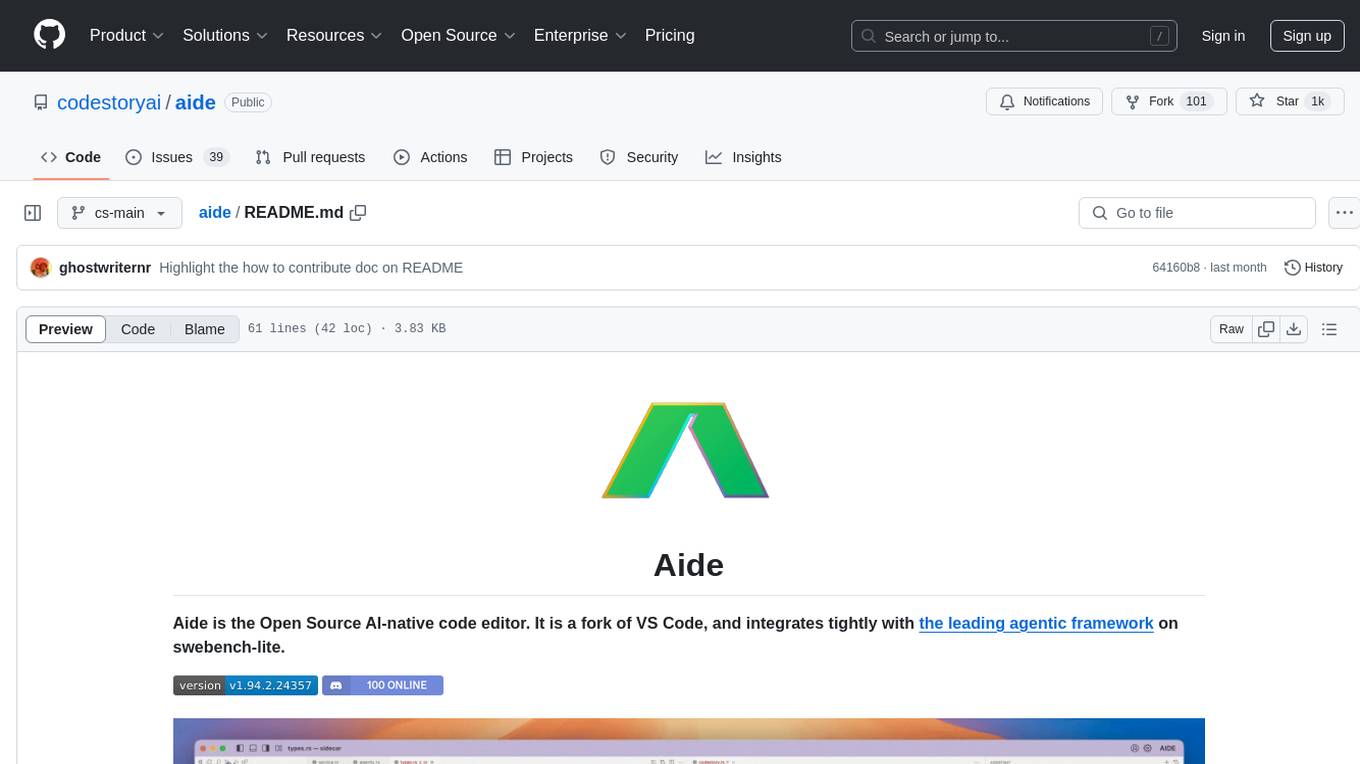
aide
Aide is an Open Source AI-native code editor that combines the powerful features of VS Code with advanced AI capabilities. It provides a combined chat + edit flow, proactive agents for fixing errors, inline editing widget, intelligent code completion, and AST navigation. Aide is designed to be an intelligent coding companion, helping users write better code faster while maintaining control over the development process.
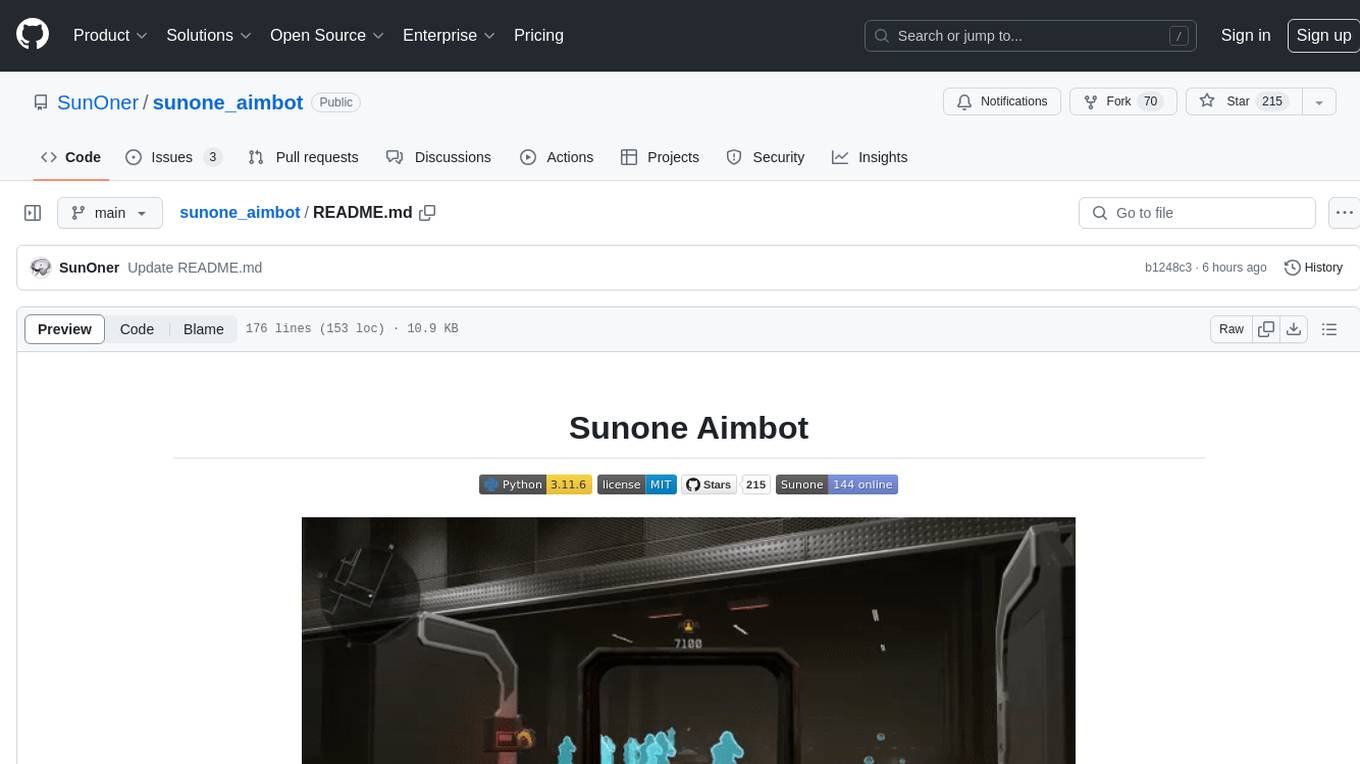
sunone_aimbot
Sunone Aimbot is an AI-powered aim bot for first-person shooter games. It leverages YOLOv8 and YOLOv10 models, PyTorch, and various tools to automatically target and aim at enemies within the game. The AI model has been trained on more than 30,000 images from popular first-person shooter games like Warface, Destiny 2, Battlefield 2042, CS:GO, Fortnite, The Finals, CS2, and more. The aimbot can be configured through the `config.ini` file to adjust various settings related to object search, capture methods, aiming behavior, hotkeys, mouse settings, shooting options, Arduino integration, AI model parameters, overlay display, debug window, and more. Users are advised to follow specific recommendations to optimize performance and avoid potential issues while using the aimbot.
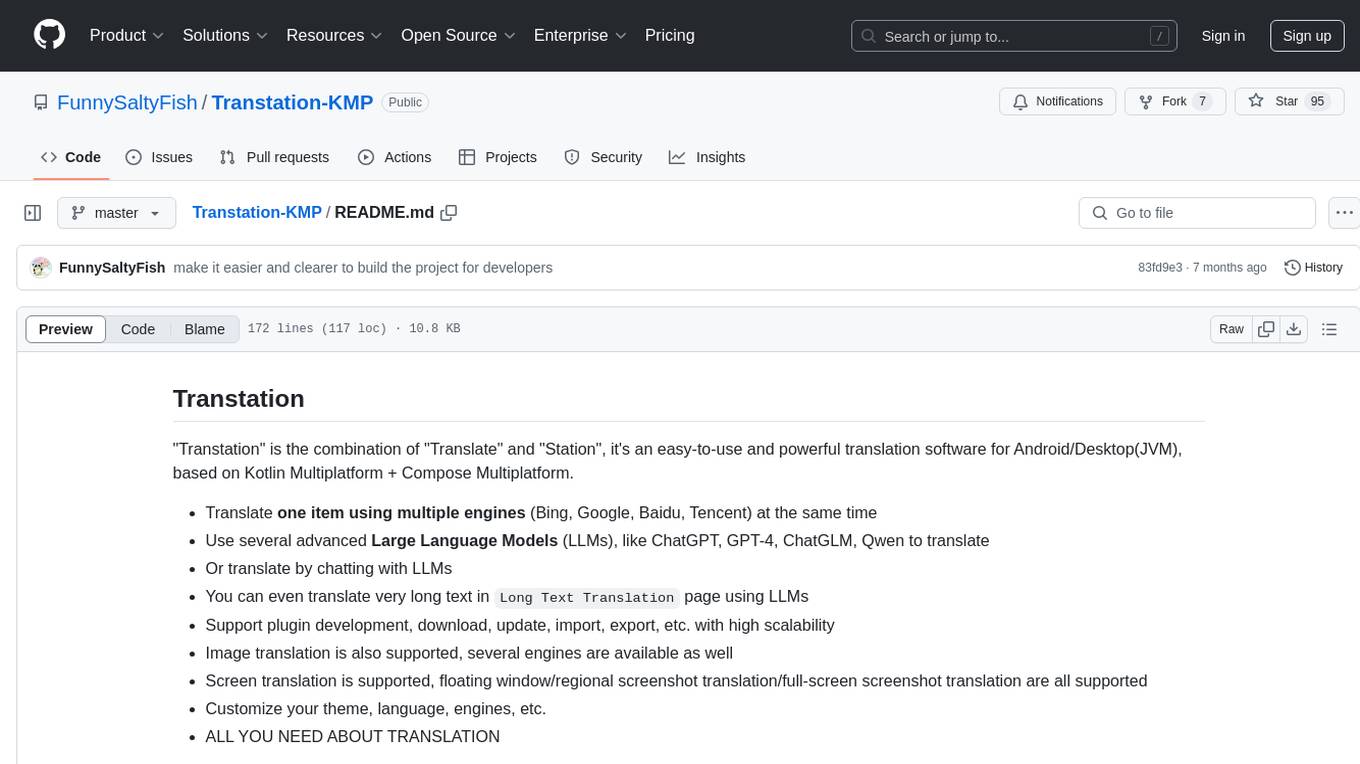
Transtation-KMP
Transtation is an easy-to-use and powerful translation software for Android/Desktop based on Kotlin Multiplatform + Compose Multiplatform. It allows users to translate one item using multiple engines simultaneously, utilize advanced Large Language Models for translation, chat with LLMs for translation, translate long text, support plugin development, image translation, and screen translation. The application is designed for Chinese users and serves as a reference for learning Jetpack Compose or Compose Multiplatform. It features Kotlin Multiplatform, Compose Multiplatform, MVVM, Kotlin Coroutine, Flow, SqlDelight, synchronized translation with multiple engines, plugin development, and makes use of Kotlin language features like lazy loading, Coroutine, sealed classes, and reflection. The application gradually adapts to Android13 with features like setting application language separately and supporting Monet icon.
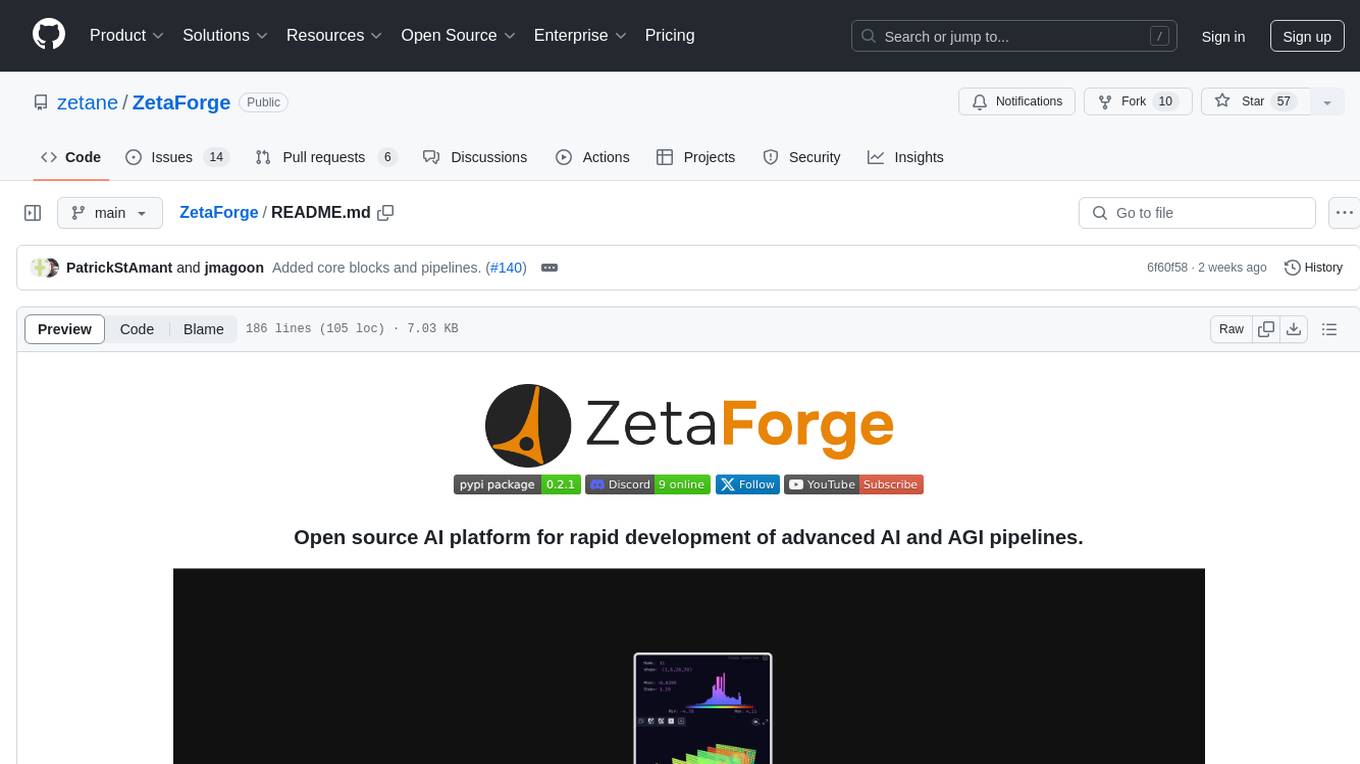
ZetaForge
ZetaForge is an open-source AI platform designed for rapid development of advanced AI and AGI pipelines. It allows users to assemble reusable, customizable, and containerized Blocks into highly visual AI Pipelines, enabling rapid experimentation and collaboration. With ZetaForge, users can work with AI technologies in any programming language, easily modify and update AI pipelines, dive into the code whenever needed, utilize community-driven blocks and pipelines, and share their own creations. The platform aims to accelerate the development and deployment of advanced AI solutions through its user-friendly interface and community support.

morphik-core
Morphik is an AI-native toolset designed to help developers integrate context into their AI applications by providing tools to store, represent, and search unstructured data. It offers features such as multimodal search, fast metadata extraction, and integrations with existing tools. Morphik aims to address the challenges of traditional AI approaches that struggle with visually rich documents and provide a more comprehensive solution for understanding and processing complex data.
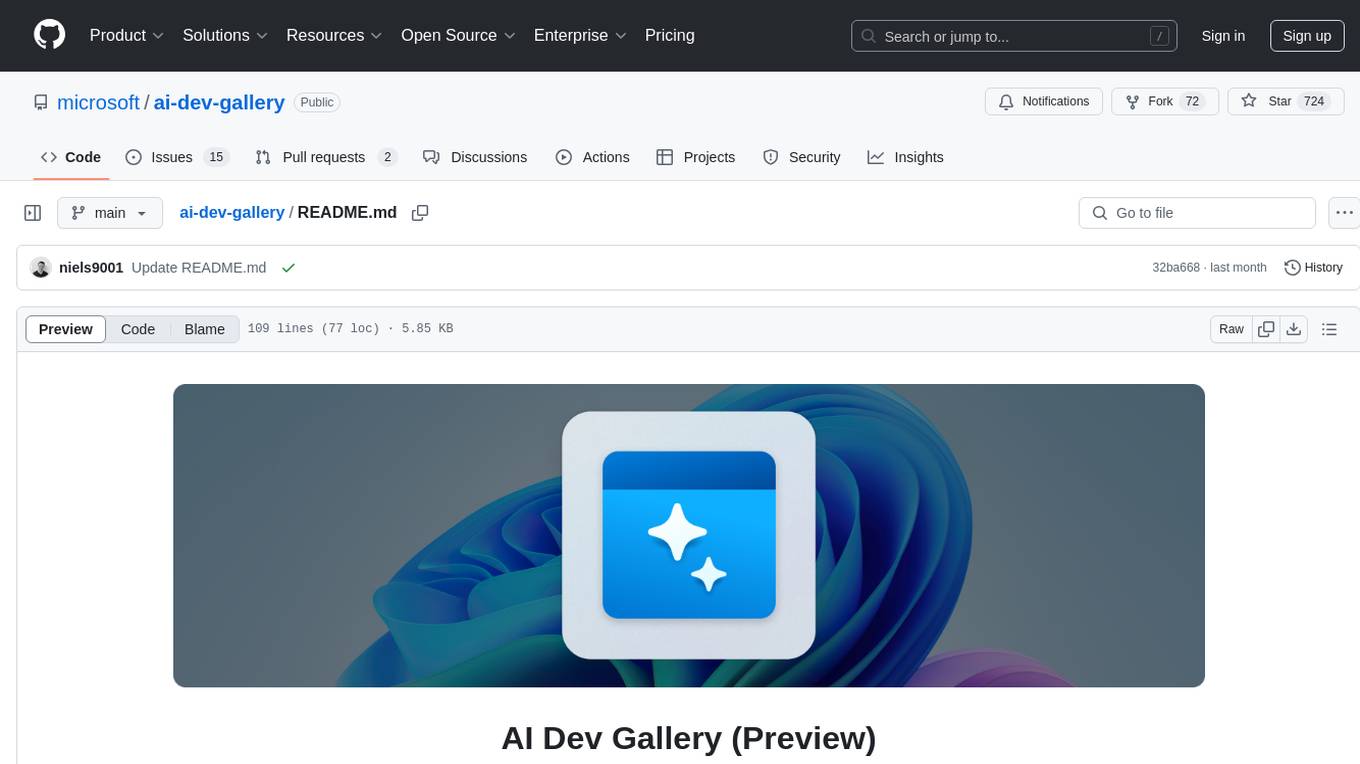
ai-dev-gallery
The AI Dev Gallery is an app designed to help Windows developers integrate AI capabilities within their own apps and projects. It contains over 25 interactive samples powered by local AI models, allows users to explore, download, and run models from Hugging Face and GitHub, and provides the ability to view the C# source code and export a standalone Visual Studio project for each sample. The app is open-source and welcomes contributions and suggestions from the community.
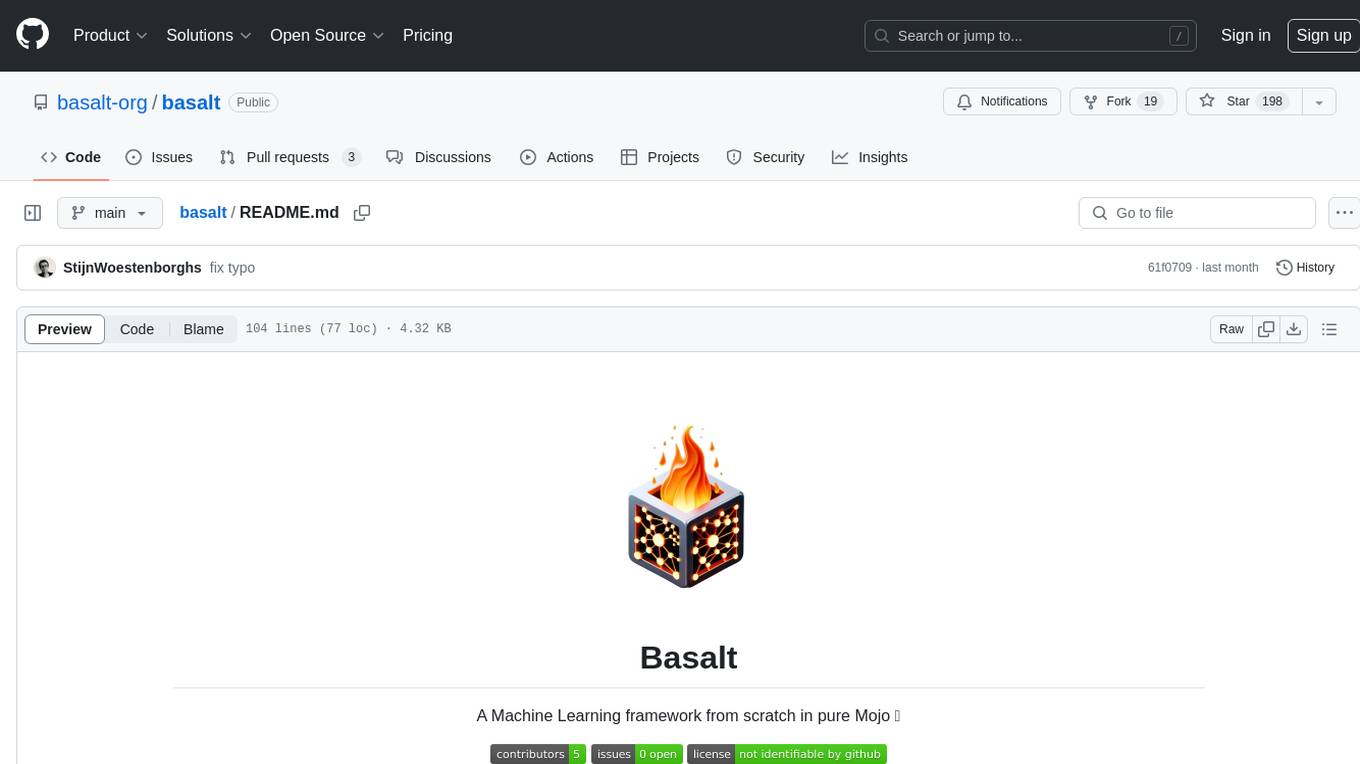
basalt
Basalt is a lightweight and flexible CSS framework designed to help developers quickly build responsive and modern websites. It provides a set of pre-designed components and utilities that can be easily customized to create unique and visually appealing web interfaces. With Basalt, developers can save time and effort by leveraging its modular structure and responsive design principles to create professional-looking websites with ease.

PanelCleaner
Panel Cleaner is a tool that uses machine learning to find text in images and generate masks to cover it up with high accuracy. It is designed to clean text bubbles without leaving artifacts, avoiding painting over non-text parts, and inpainting bubbles that can't be masked out. The tool offers various customization options, detailed analytics on the cleaning process, supports batch processing, and can run OCR on pages. It supports CUDA acceleration, multiple themes, and can handle bubbles on any solid grayscale background color. Panel Cleaner is aimed at saving time for cleaners by automating monotonous work and providing precise cleaning of text bubbles.
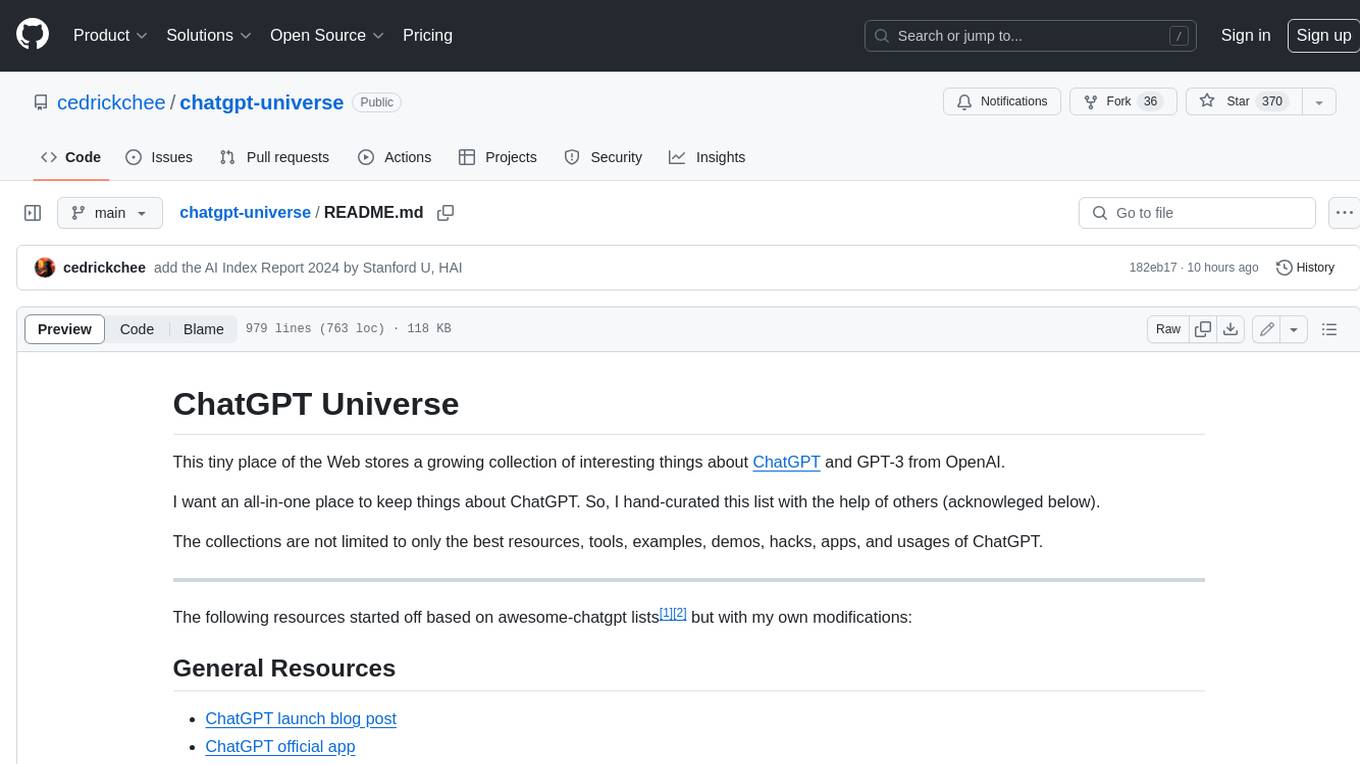
chatgpt-universe
ChatGPT is a large language model that can generate human-like text, translate languages, write different kinds of creative content, and answer your questions in a conversational way. It is trained on a massive amount of text data, and it is able to understand and respond to a wide range of natural language prompts. Here are 5 jobs suitable for this tool, in lowercase letters: 1. content writer 2. chatbot assistant 3. language translator 4. creative writer 5. researcher
For similar tasks

sonic3air
Sonic 3 A.I.R. is a non-profit fan game project that provides source code including dependencies for "Sonic 3 - Angel Island Revisited," a fan-made remaster of Sonic 3 & Knuckles. The project is split into several different projects, including external dependencies, librmx libraries, Lemonscript language library, Oxygen Engine, and S3AIR-specific C++ code. To build for different platforms, refer to the readme files in the respective subdirectories of "Oxygen/sonic3air/build." External libraries and code used in this project include SDL2, libogg & libvorbis, zlib, libcurl, jsoncpp, GLEW, Sound chip emulation related code from Genesis Plus GX, Discord Game SDK, xBRZ upscaler shader code, and Hqx upscaler shader code & data files.
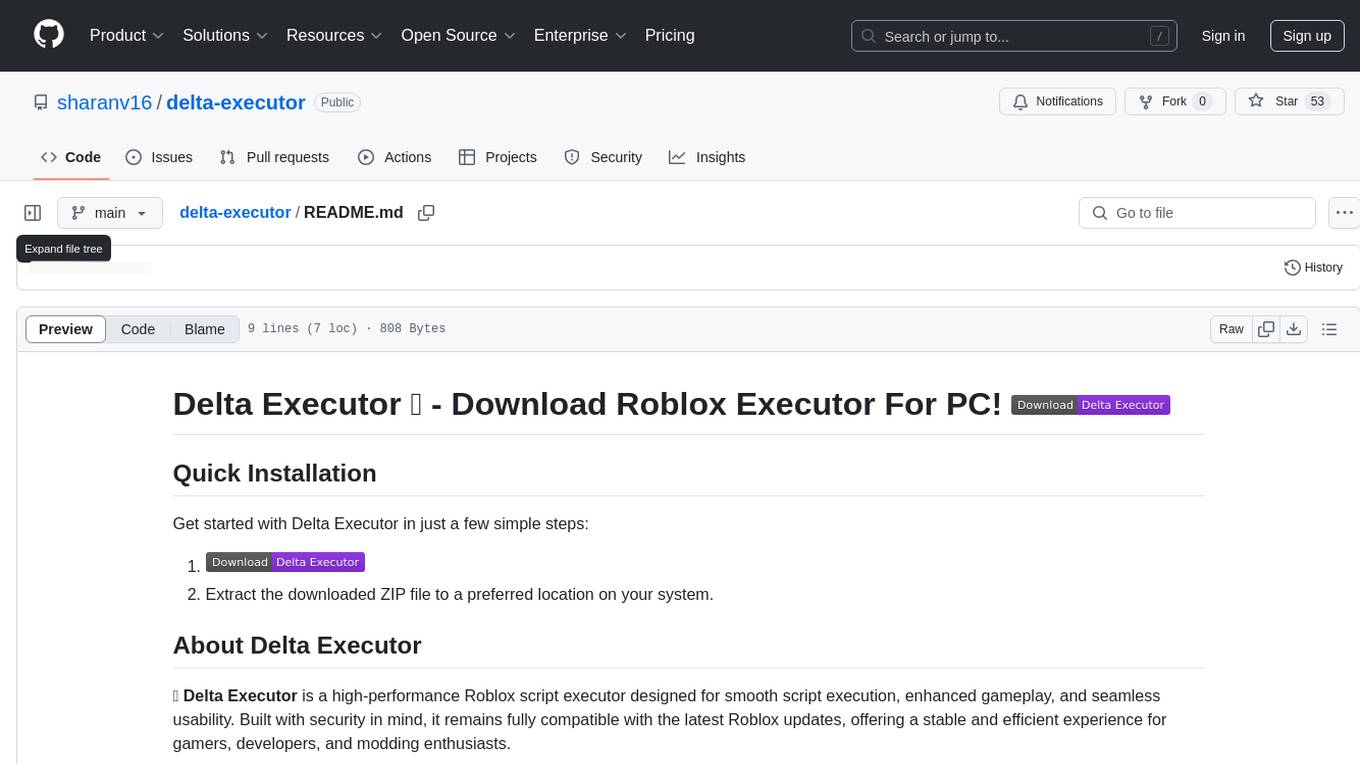
delta-executor
Delta Executor is a high-performance Roblox script executor designed for smooth script execution, enhanced gameplay, and seamless usability. It is built with security in mind, fully compatible with the latest Roblox updates, offering a stable and efficient experience for gamers, developers, and modding enthusiasts.
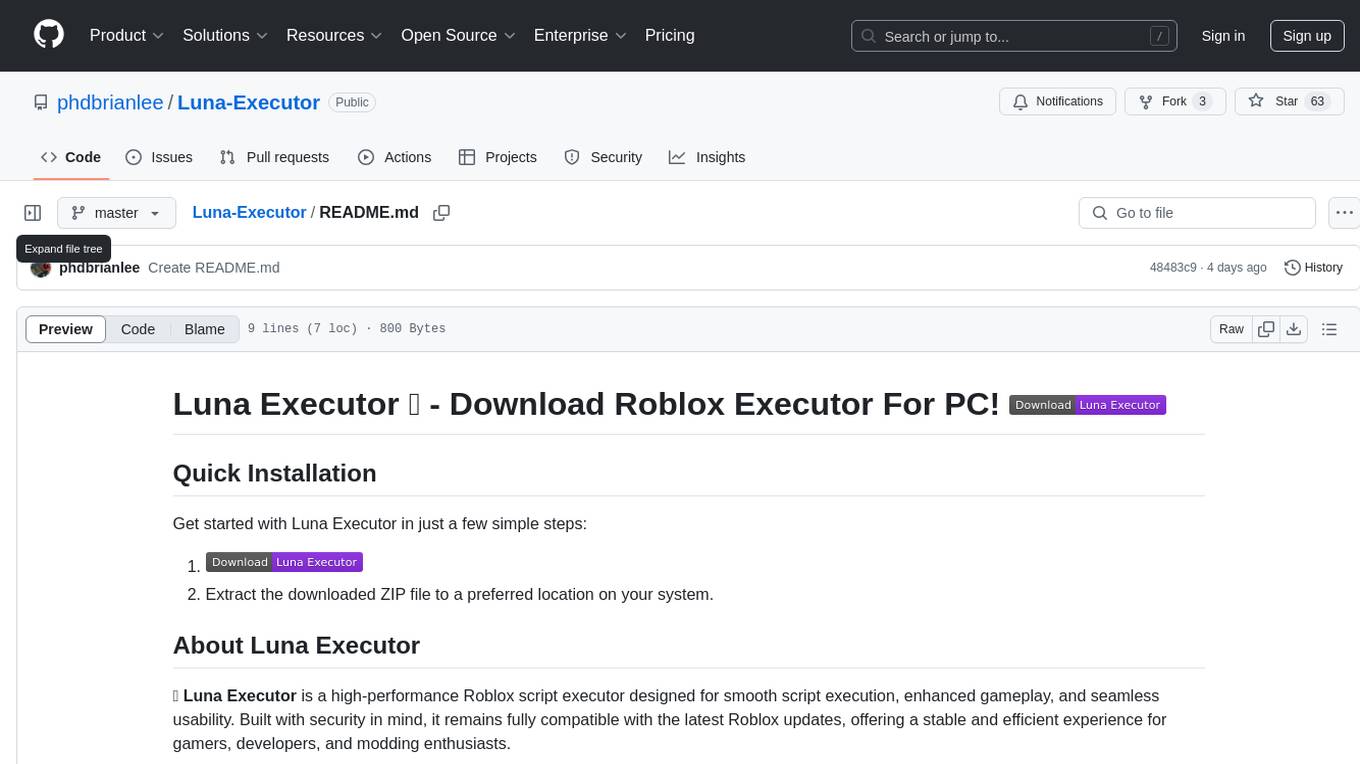
Luna-Executor
Luna Executor is a high-performance Roblox script executor designed for smooth script execution, enhanced gameplay, and seamless usability. Built with security in mind, it remains fully compatible with the latest Roblox updates, offering a stable and efficient experience for gamers, developers, and modding enthusiasts.
For similar jobs

SillyTavern
SillyTavern is a user interface you can install on your computer (and Android phones) that allows you to interact with text generation AIs and chat/roleplay with characters you or the community create. SillyTavern is a fork of TavernAI 1.2.8 which is under more active development and has added many major features. At this point, they can be thought of as completely independent programs.
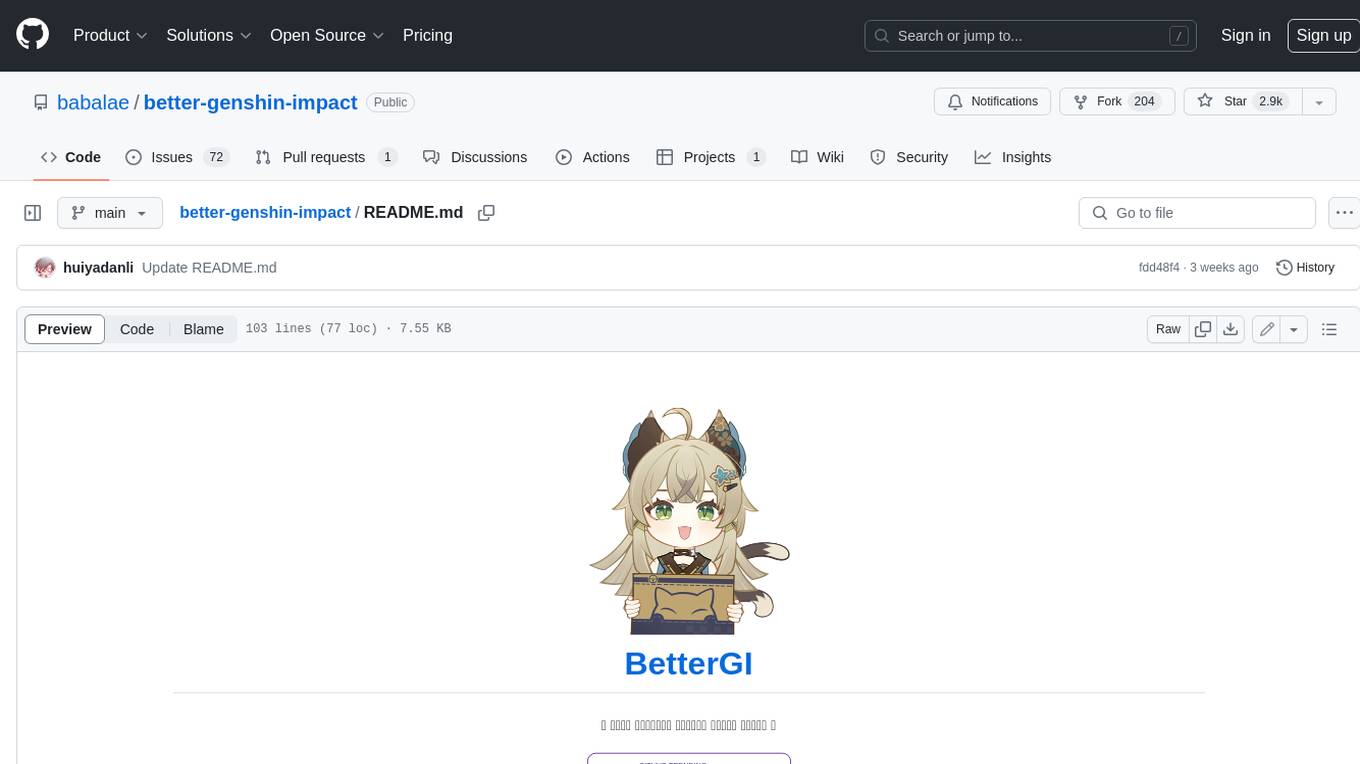
better-genshin-impact
BetterGI is a project based on computer vision technology, which aims to make Genshin Impact better. It can automatically pick up items, skip dialogues, automatically select options, automatically submit items, close pop-up pages, etc. When talking to Katherine, it can automatically receive the "Daily Commission" rewards and automatically re-dispatch. When the automatic plot function is turned on, this function will take effect, and the invitation options will be automatically selected. AI recognizes automatic casting, automatically reels in when the fish is hooked, and automatically completes the fishing progress. Help you easily complete the Seven Saint Summoning character invitation, weekly visitor challenge and other PVE content. Automatically use the "King Tree Blessing" with the `Z` key, and use the principle of refreshing wood by going online and offline to hang up a backpack full of wood. Write combat scripts to let the team fight automatically according to your strategy. Fully automatic secret realm hangs up to restore physical strength, automatically enters the secret realm to open the key, fight, walk to the ancient tree and receive rewards. Click the teleportation point on the map, or if there is a teleportation point in the list that appears after clicking, it will automatically click the teleportation point and teleport. Set a shortcut key, and long press to continuously rotate the perspective horizontally (of course you can also use it to rotate the grass god). Quickly switch between "Details" and "Enhance" pages to skip the display of holy relic enhancement results and quickly +20. You can quickly purchase items in the store in full quantity, which is suitable for quickly clearing event redemptions,塵歌壺 store redemptions, etc.

agnai
Agnaistic is an AI roleplay chat tool that allows users to interact with personalized characters using their favorite AI services. It supports multiple AI services, persona schema formats, and features such as group conversations, user authentication, and memory/lore books. Agnaistic can be self-hosted or run using Docker, and it provides a range of customization options through its settings.json file. The tool is designed to be user-friendly and accessible, making it suitable for both casual users and developers.
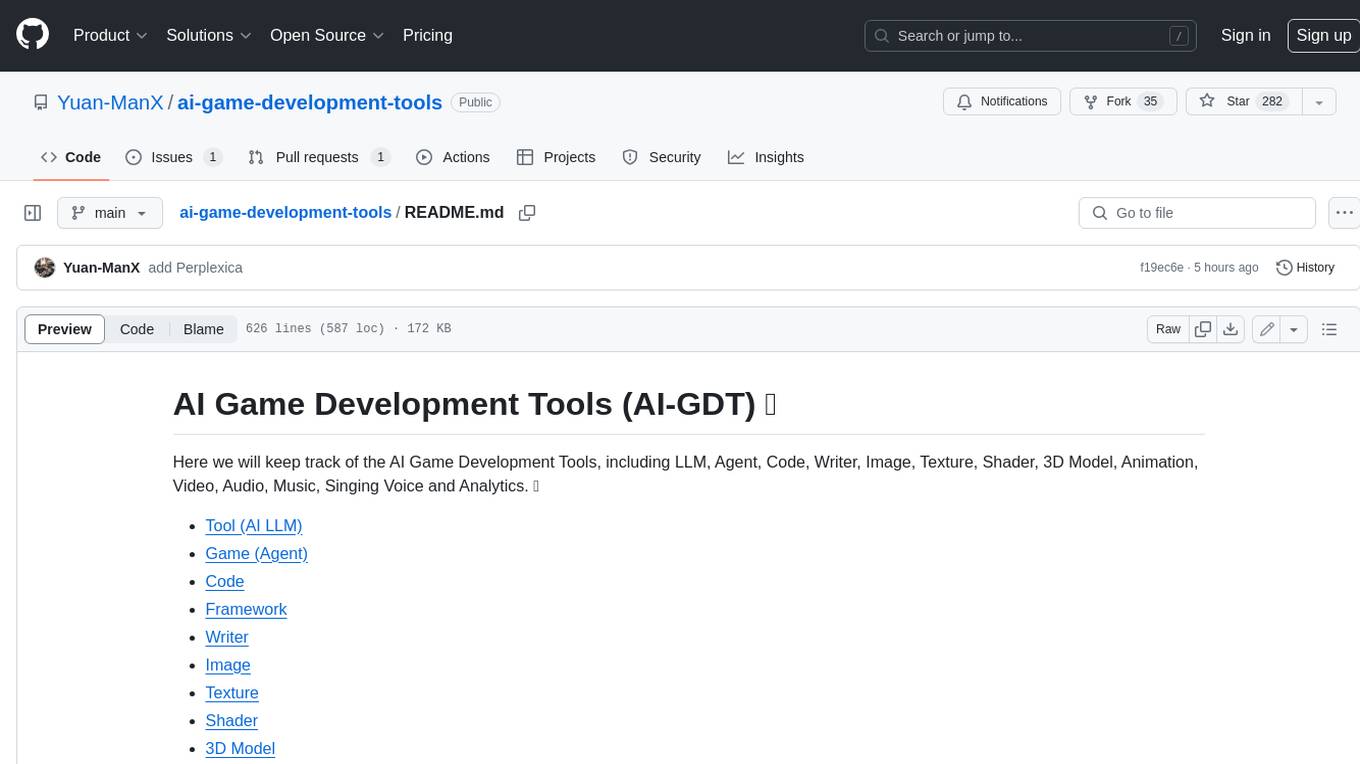
ai-game-development-tools
Here we will keep track of the AI Game Development Tools, including LLM, Agent, Code, Writer, Image, Texture, Shader, 3D Model, Animation, Video, Audio, Music, Singing Voice and Analytics. 🔥 * Tool (AI LLM) * Game (Agent) * Code * Framework * Writer * Image * Texture * Shader * 3D Model * Avatar * Animation * Video * Audio * Music * Singing Voice * Speech * Analytics * Video Tool
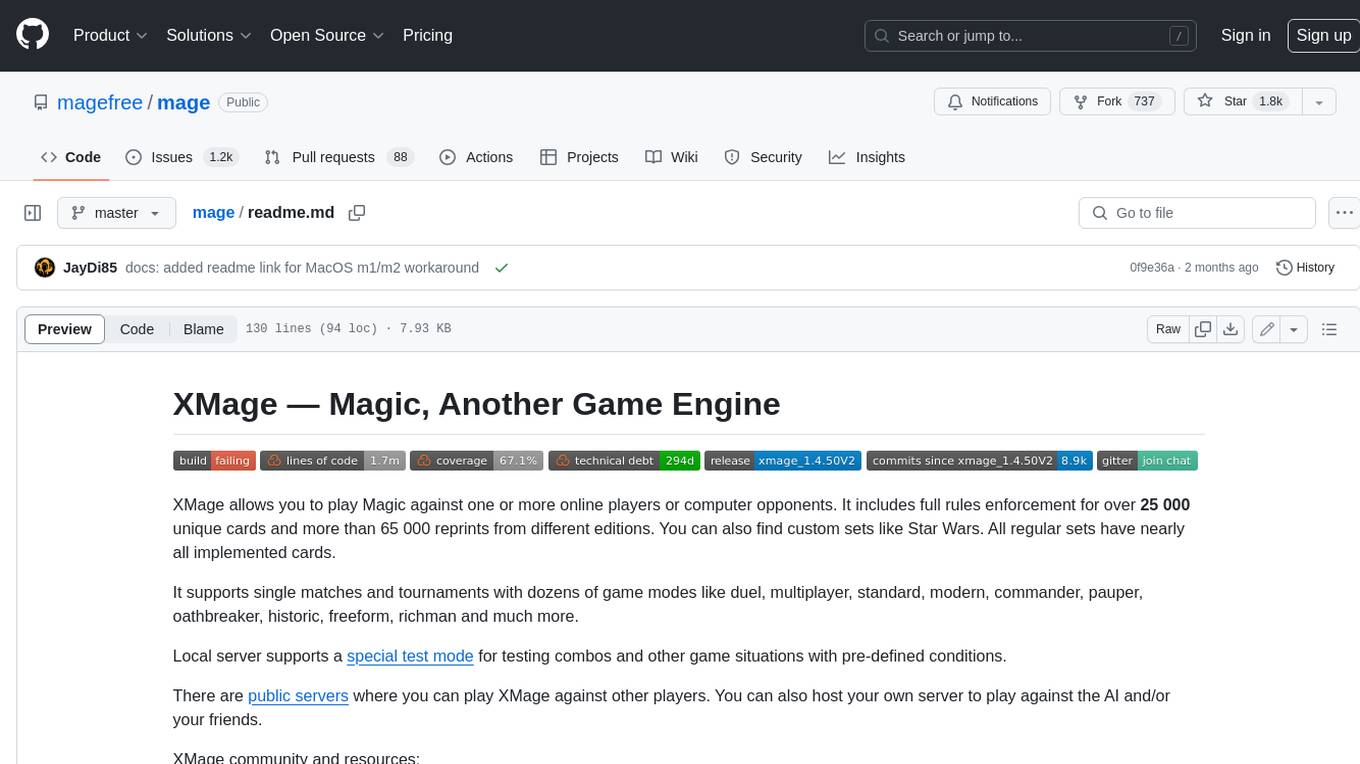
mage
XMage is an open-source, cross-platform application that allows users to play the collectible card game Magic: The Gathering online against other players or computer opponents. It supports over 25,000 unique cards and more than 65,000 reprints from different editions, including custom sets like Star Wars. XMage supports single matches and tournaments with dozens of game modes, including duel, multiplayer, standard, modern, commander, pauper, oathbreaker, historic, freeform, and richman. It also features a deck editor, a player rating system, and support for special formats like Commander, Oathbreaker, Cube, Tiny Leaders, Super Standard, and Historic Standard.
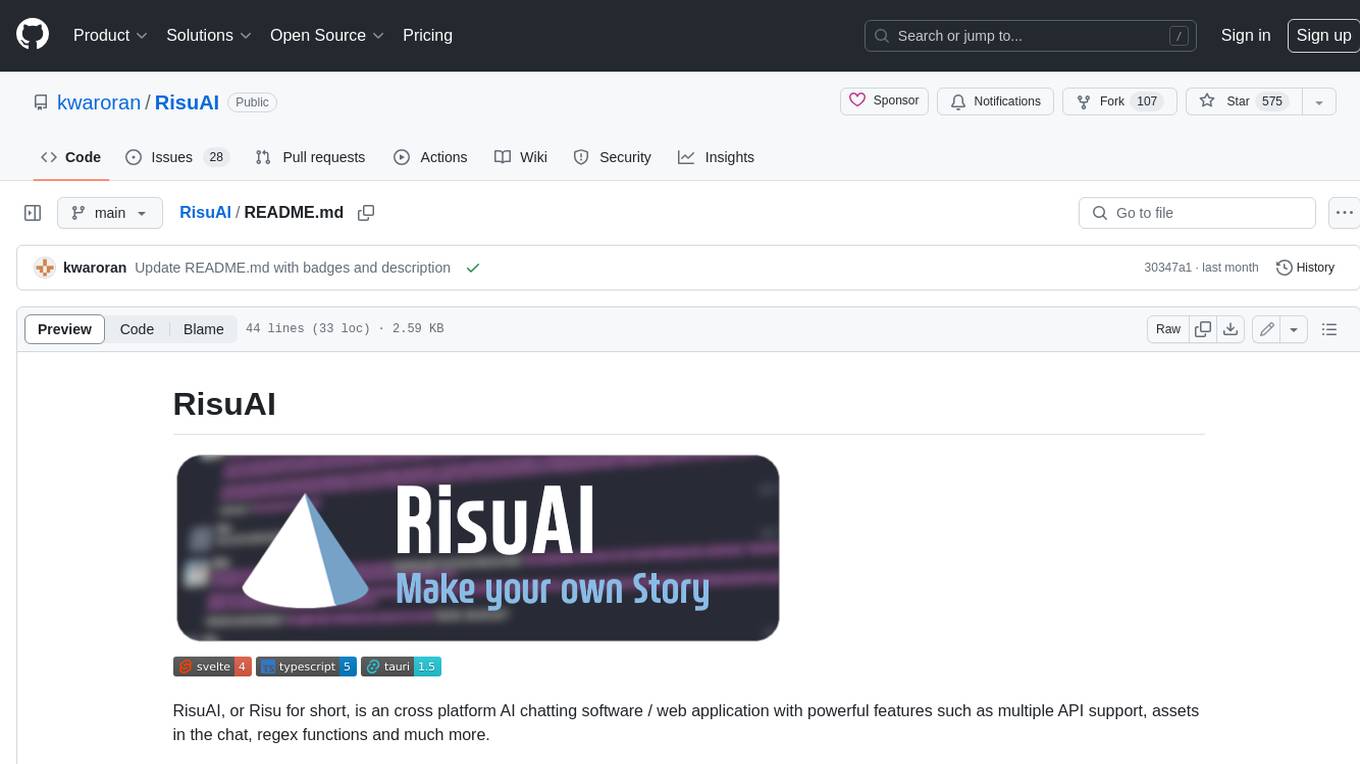
RisuAI
RisuAI, or Risu for short, is a cross-platform AI chatting software/web application with powerful features such as multiple API support, assets in the chat, regex functions, and much more.
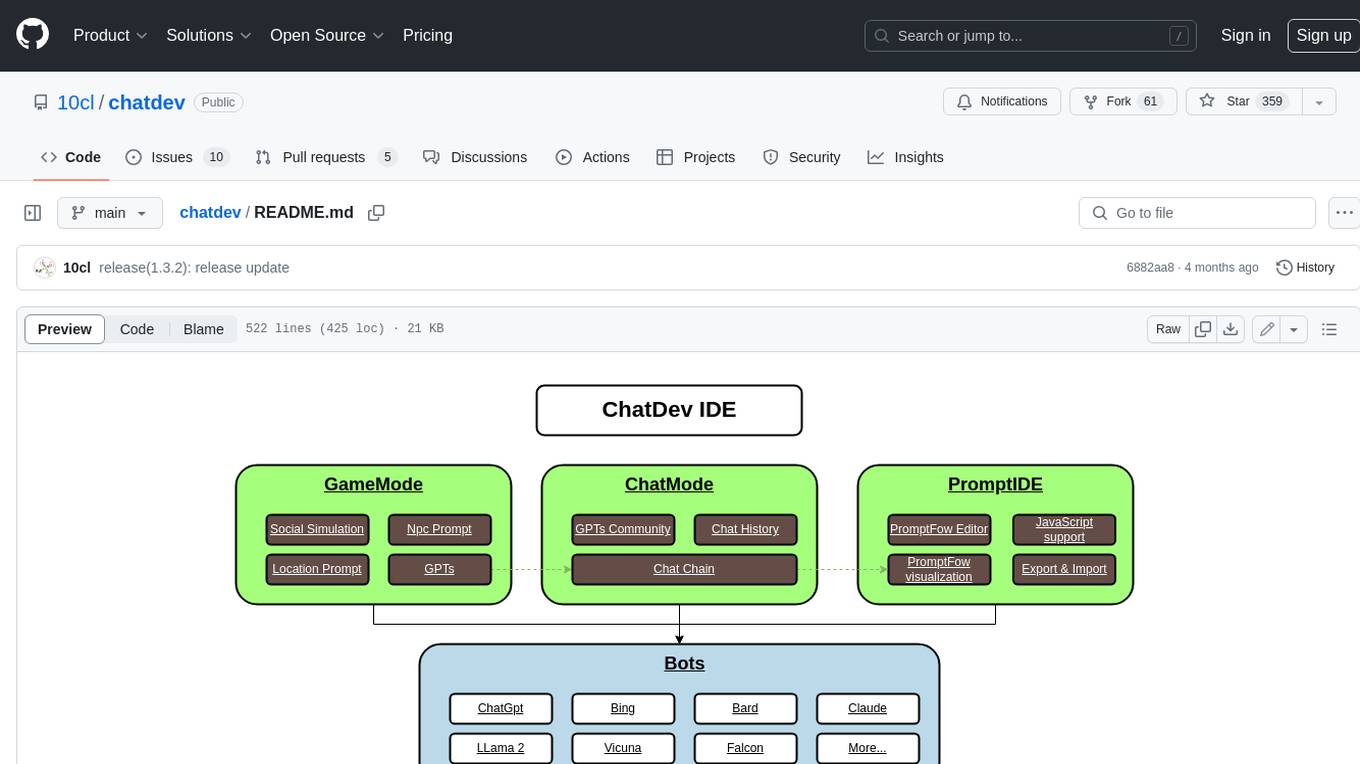
chatdev
ChatDev IDE is a tool for building your AI agent, Whether it's NPCs in games or powerful agent tools, you can design what you want for this platform. It accelerates prompt engineering through **JavaScript Support** that allows implementing complex prompting techniques.
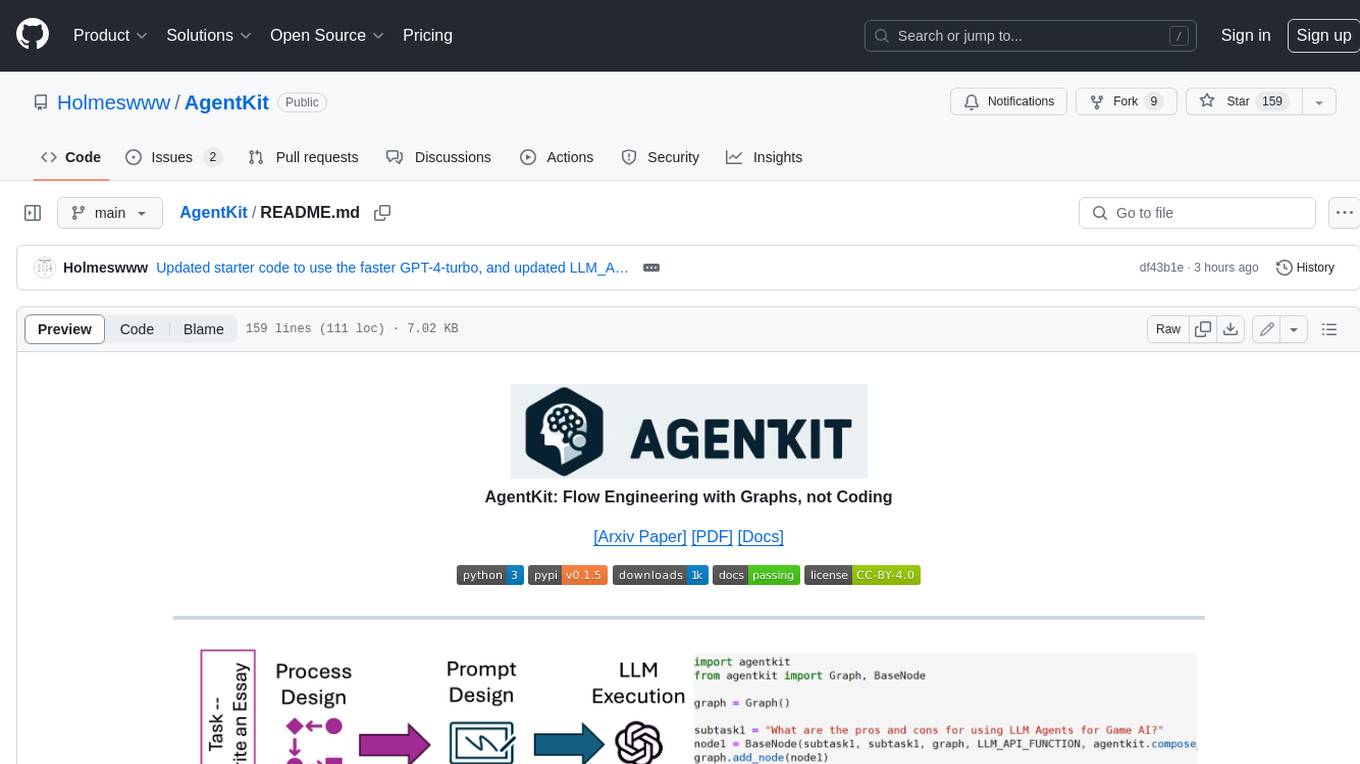
AgentKit
AgentKit is a framework for constructing complex human thought processes from simple natural language prompts. It offers a unified way to represent and execute these processes as graphs, making it easy to design and tune agents without any programming experience. AgentKit can be used for a variety of tasks, including generating text, answering questions, and making decisions.